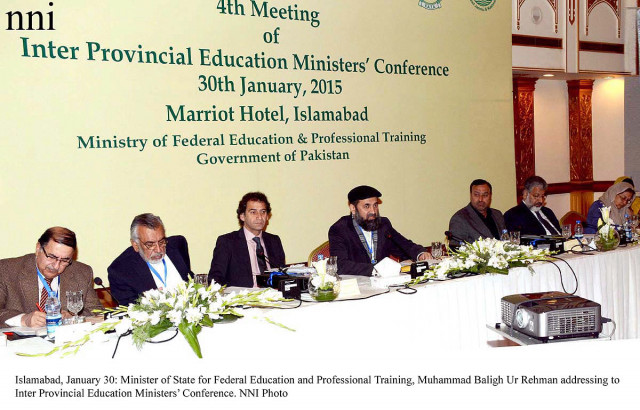Education issues: New policy to be implemented next year, says minister
Only K-P, AJK represented by ministers at meeting.

Muhammad Baligh Ur Rehman speaks at IPEMC. PHOTO: NNI
This was decided at the forth Interprovincial Education Ministers’ conference, held at a local hotel on Friday, sources privy to the development told The Express Tribune.
The Federal Education and Professional Training Ministry will continue to support the provinces in meeting minimum standards of education, the source added.
Minister of State for Education Baleeghur Rehman said the government was set to upgrade and review the last education policy — made in 2006 — by the end of this year, and implement it from January 2016.
He said the forum would discuss and finalise issues of education that were common in the provinces for better integration and coordination on standards, policies.
The conference witnessed low representation from three provinces — Punjab, Balochistan and Sindh — suggesting a lack of interest in education.
Two ministers from Khyber-Pakhtunkhwa and one from Azad Jammu Kashmir (AJK) attended the conference.
No minister or senior officials from the three provinces showed up, with only a director from Sindh attending the conference. The province initially opposed the idea of the conference, but later agreed to participate as an observer.
The same opposition was witnessed at the third meeting in October 2014, where the National Curriculum Council was approved by the other the three provinces and Azad Kashmir.
The provincial representatives shared lengthy presentations with the participants.
The issue of interprovincial coordination surfaced after the passage of 18th Amendment and subsequent devolution of the education ministry, which left the provinces and other areas in the lurch in the absence of coordination mechanism particularly with regard to ensuring a uniform system in the education sector.
A major concern being felt was the lack of commonly-agreed minimum standards to serve as guidelines for all aspects of quality education including curriculum. The country’s top court had also observed in 2011 that the federal government cannot absolve itself of the responsibility to impart education, despite the passage of the 18th Amendment.
On behalf of Interprovincial Technical Working Group on Quality Education, Nighat Lone shared the agreed minimum standards among the provinces and federal education ministry.
“After consultative meetings with members of different provinces, it was agreed to set up curriculum bureaus, textbook boards, teacher training institutes, examination assessment boards and administration at provincial level that will be in coordination with IPEMC.”
She also shared other salient points including standards for teachers, learning assessment and school environment.
Sardar Raza Muhammad Khan Barrech, education adviser to the Balochistan chief minister, spoke about the abysmal education scenario in the province. “We have 1.1 million students enrolled in schools in the 5 to 16 age bracket, while 1.7 million are out-of-school in the same age group,” he remarked.
He claimed that retention of students after matriculation was the prime challenge for them, as a high number of students just dropped out.
“Besides, the problem exacerbates when we submit proposals and the reply from finance department is that they do not have enough funds to support them,” he lamented.
Representatives from AJK, K-P, Sindh and Punjab also shared their preparation and plans for implementation of National Plan of Action.
K-P Higher Education Minister Mushtaq Ghani suggested that the federal state minister call a consultative meeting over the abrupt formation of provincial higher education commissions by Sindh and Punjab.
“We do not want to establish such a body in haste as it could be a disaster,” he said, adding that it must remain with HEC which is better office to control higher education in country.
To this, HEC chairperson Dr Mukhtar Ahmad added that decisions should not be taken in haste and this forum could be used to discuss policy issues.
The federal minister replied that in the next meeting, discussions may focus on the issue of higher education bodies at provincial level and how to meet any challenges.
Published in The Express Tribune, January 31st, 2015.



















COMMENTS
Comments are moderated and generally will be posted if they are on-topic and not abusive.
For more information, please see our Comments FAQ